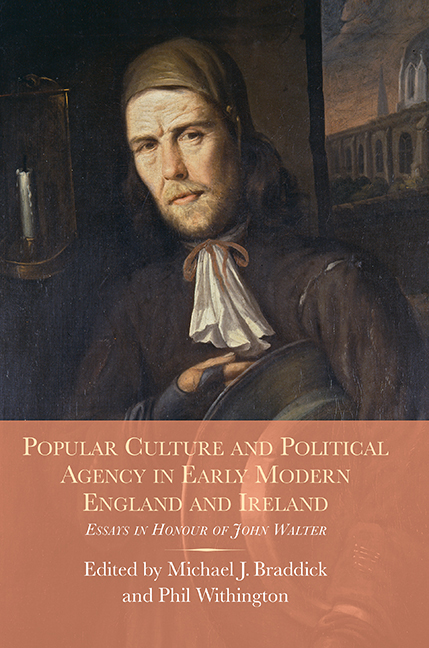 Popular Culture and Political Agency in Early Modern England and Ireland
Popular Culture and Political Agency in Early Modern England and Ireland Published online by Cambridge University Press: 09 May 2017
The challenges of finding access to popular political culture have been amply demonstrated and ably met by John Walter's scholarship, not least in his analysis of the records of riot which, he argues, allow ‘subordinate groups, rendered otherwise silent by the inequalities of literacy and preservation of the historical record, to testify to their attitudes and beliefs’. One noteworthy feature of such records is the inclusion of the actions and voices of female participants who played prominent roles in varied forms of popular protest, and most especially in food riots. Women's moral authority in demanding just treatment in the market in times of scarcity has yielded glimpses of female leadership such as Ann Carter's exclamation – as ‘Captain’ of a contingent of rioters in Maldon in Essex in 1629 – that ‘I will be your leader for we will not starve.’ Accounting for the more general presence of women in the crowd that gathered at Maldon to prevent grain shipments, Walter ascribed their motivations to two factors. First was the ‘special licence’ they derived from a gendered division of labour which designated women as ‘provisioners of their families’. Second was the ‘licence afforded them by their ambivalent legal status’, which may have rendered them less vulnerable to formal prosecution. These explanations have proved foundational to approaches to women's direct participation in the politics of subsistence, although historians have disagreed over the wider significance of such examples of female political agency.
On the one hand, the ascription of women 's roles in popular protest to starkly gendered divisions of labour as well as to women 's imprecise legal status has become commonplace. In the English context, the emphasis on women 's domestic responsibilities for purchasing food originated in E. P. Thompson 's attribution of women 's participation in riots both to their involvement in ‘faceto- face marketing ’ which made them most acutely aware of price fluctuations and trading abuses, and to ‘the calculation that they had slightly greater immunity than the men from the retaliation of the authorities ’. In his exploration of the Wealden riots associated with disruption to the cloth trade, Peter Clark similarly ascribed the role of women to their ‘greater immunity from the law than men’ and ‘a special immunity for women who were unable to fulfil their familial role of feeding their household because of food shortage’.
To save this book to your Kindle, first ensure [email protected] is added to your Approved Personal Document E-mail List under your Personal Document Settings on the Manage Your Content and Devices page of your Amazon account. Then enter the ‘name’ part of your Kindle email address below. Find out more about saving to your Kindle.
Note you can select to save to either the @free.kindle.com or @kindle.com variations. ‘@free.kindle.com’ emails are free but can only be saved to your device when it is connected to wi-fi. ‘@kindle.com’ emails can be delivered even when you are not connected to wi-fi, but note that service fees apply.
Find out more about the Kindle Personal Document Service.
To save content items to your account, please confirm that you agree to abide by our usage policies. If this is the first time you use this feature, you will be asked to authorise Cambridge Core to connect with your account. Find out more about saving content to Dropbox.
To save content items to your account, please confirm that you agree to abide by our usage policies. If this is the first time you use this feature, you will be asked to authorise Cambridge Core to connect with your account. Find out more about saving content to Google Drive.